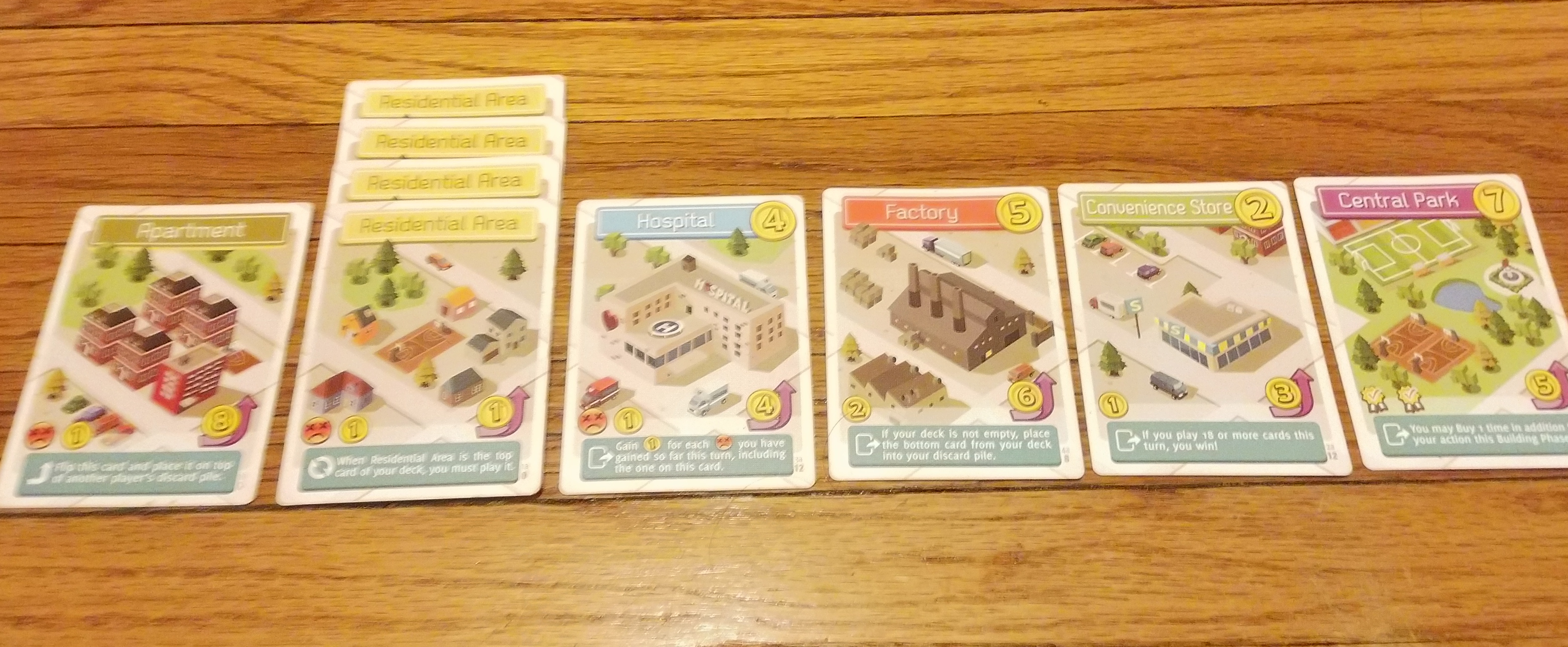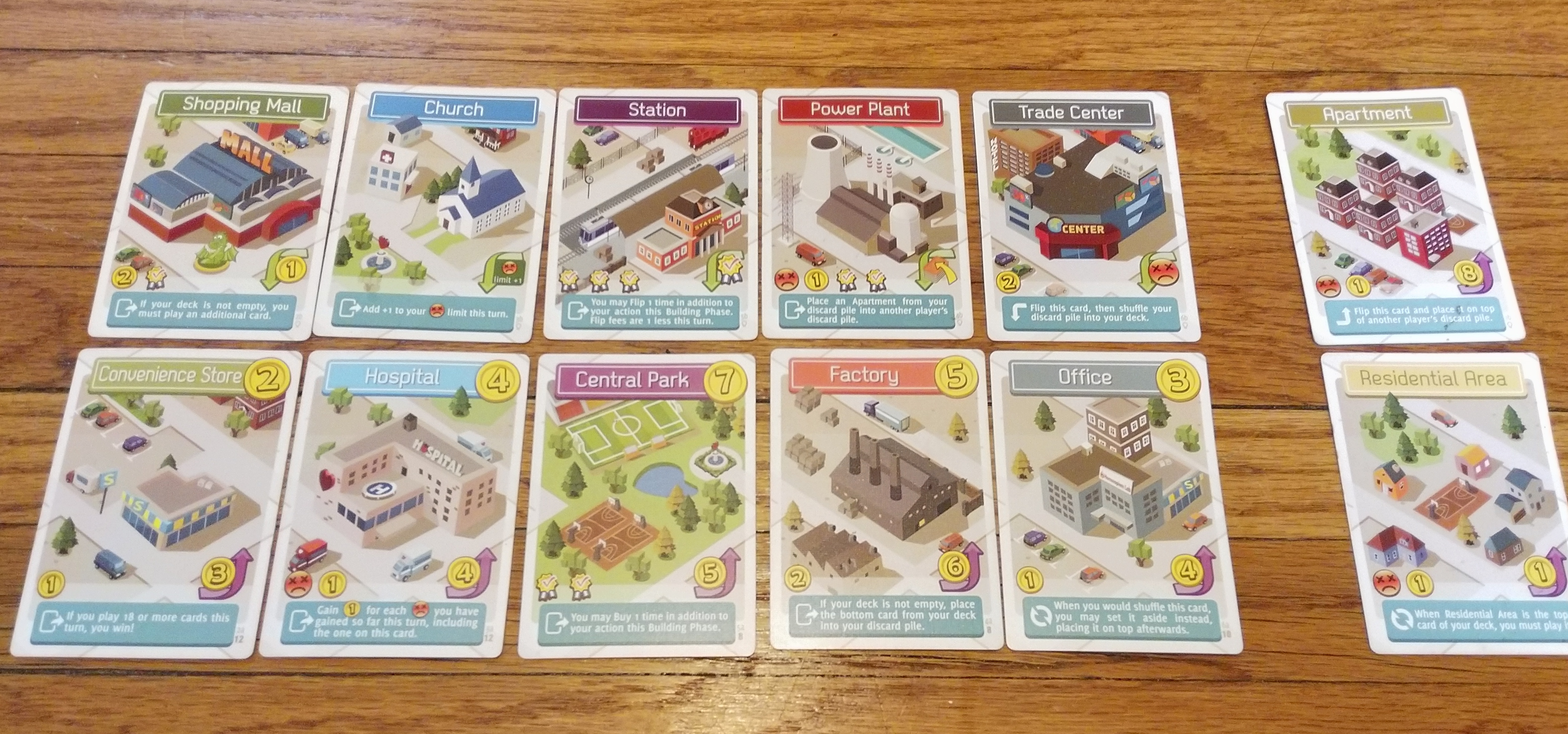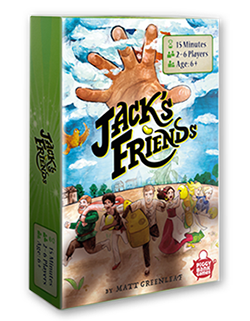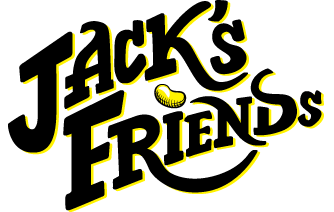Competitive NIMBY: A Review of Flip City
June 29, 2018
Flip City is a game that shirks off easy classification. It is a deck builder but that is not all it is. It is press your luck taken to its zenith, played quickly to decisive results. The gameplay simple, the outcome competitive despite a happy helping of luck. Questions are asked of you and how you answer will be the difference between community and chaos.
Community Planning Day 1

All cards in Flip City are double sided so it will be important while playing and especially shuffling that you do not change the facing of your cards. This particular sleight of hand can take some getting used to but it is essential to the game functioning properly. Each player starts with a deck of 9 cards (4 Residential Areas, 1 Apartment, 1 Hospital, 1 Factory, 1 Convenience Store, and 1 Central Park). The first 6 of these cards have sad faces on them.
Sad faces control the press your luck aspect of this game. You can still play with 2 sad faces in play but the 3rd sad face busts you where you don’t get to spend any of your money for the turn. To force the issue whenever your top card is a residential area you must play it. This means you often bust by revealing your next top card to be a residential area which you can’t handle. Fairly regularly it will be correct to strategically bust just so your plays next turn can be that much stronger. Churches, the upgraded side of the hospital, allow you to play additional sad faces without busting and as a result are the payoff card that increases you deck output by the most.
Each turn assuming you don’t bust you can spend your coins on buying a card, upgrading a card, or buying and upgrading that same card. Normally on your turn you can do 1 of these 3 main actions but central park and its upgraded side the station give you additional buy and upgrade actions respectively. This is where the payoff in the press your luck lies. You know the exact content of your deck at any time, just not its exact order. That means you can always weigh the pros and cons of pushing for more money to hit that next better buy or upgrade and just staying put with what you have. Busting a lot by going to far will leave you with nothing but too conservation play will slow your game down and leave the door open for your opponents.

Community Planning Day 10
The game ends immediately if any player can play 8 badges in the same round or can play 18 cards with 1 of them being a convenience store in the same round. If you can reach 18 card it is all but guaranteed that at least one of them will be a convenience store and it turns out it is far more common to win with 18 cards than 8 badges. The biggest reason for this is it turns out 8 badges is a lot and it requires around 18 cards to score consistently anyway but the by far bigger reason is simpler. You acquire cards just by playing the game, you will reach 18 eventually even if you are not trying. Badges on the other are something that you have to focus on acquiring especially since the major source of badges, central park, does not directly give other resources besides badges.
Because winning with 18 cards is so common it turns out double buying convenience stores at 4 money with a central park is a strong use of 4 money. Sometimes the game can seem like it is encouraging missionary work because how well you are doing tracks pretty closely with how many churches you have built. With 3 churches you have a chance to play out your entire deck. As your number of churches goes that chance does also.
Community Planning Day 25+
I think the games works so well because it takes this really dynamic system and turns it into an engine to the barest extent possible. By the time you can play all of your cards consistently you already won the game 3 turns back. If you look into the math for busting between your sad face and churches you see each church represent dramatic shifts in probability. Knowing where you are at and what your deck is capable of moment to moment is 1 of the key skills to being good at Flip City.
An element I have found interesting is the ability of early apartment upgrades to make your deck that much more consistent and make pushing that much safer. I have found if you can reach a 3/2 split of apartments and residential areas it becomes pretty difficult to bust naturally. Often upgrading a residential area represents a real opportunity cost so therein lies the rub. The easiest way to mitigate that cost is to slot these upgrades in during buys you would have made anyway with a central park in the mix. Even then you will be that little bit slower than your opponent that skipped on the upgrades so if they are not punished by their residential areas they will have a slight edge.
Review Board
Back in 2011 Mark Rosewater famously made the case for streamlining magic and reigning in its complexity. This effort was done under the moniker the New World Order. Personally I think their goals were noble and paid dividends in the following years with increased player numbers and some really great limited formats. I think those same lessons can and have been applied to board games, I think Flip City is one such game.
The core mechanic of Flip City is very similar to that of Mystic Vale. In the much heavier Mystic Vale the mechanic seems broken and irredeemable. Flip City on the other hand is so much tighter of a game that this seemingly broken system instead seems dynamic and full of life.
My only real gripe with Flip City, and it is a minor one, is that some of the card options are so underpowered that they seem to serve no purpose. The worst offender of this has to be the trade center which is the upgraded side of the office. The costs associated with acquiring and then using the trade center are so prohibitively expensive it makes me think the developers thought its ability is really good and must be expensive to prevent abuse. That has not been my experience and after a few games of trying it just to see no ever goes for it anymore. It is fine for some abilities to be better than others but it should be the case that options are optimal some fraction of the time to justify their existence.
Flip City is a great small box game that I will be playing for years to come. It does not get the credit it deserves and if you have not played it yet I think you should check it out. May your buys be big and your sad faces never bust, the fate of a city depends on it.


; ?>/images/flatlogo.png) Ⓒ 2023 Piggy Bank Games
Ⓒ 2023 Piggy Bank Games